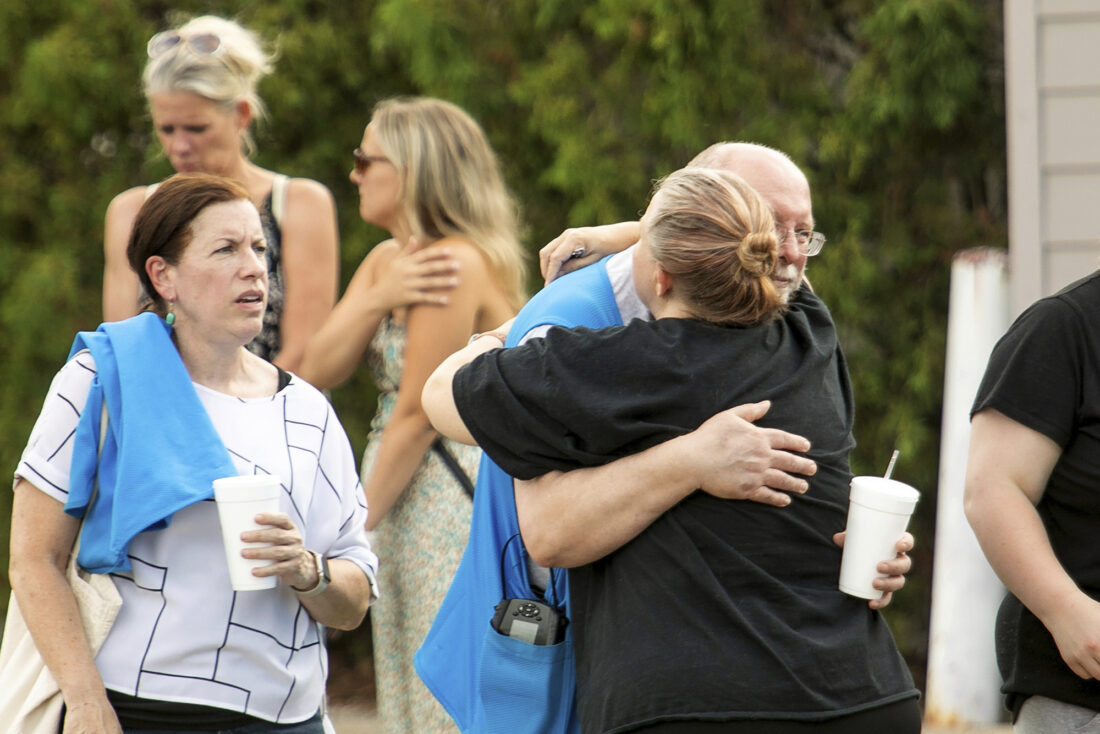Psychiatric demands outweigh resources in Michigan

Walmart employees and customers wait outside while law enforcement investigates the scene after a stabbing incident in Traverse City, Mich., Saturday July 26, 2025. (Jan-Michael Stump/Traverse City Record-Eagle via AP)
ALPENA — Local and state authorities say that the need for psychiatric services in Michigan outweighs the available resources, putting pressure on medical centers and emergency services.
The recent mass stabbing in Traverse City on Saturday has opened discussion regarding the lack of mental health support and access to care in Northern Lower Michigan communities.
Alpena County Sheriff Erik Smith explained that mental illness is prevalent in crime, and law enforcement agencies have become the de facto stewards of mental health crises in our communities nationwide.
He explained that regardless of mental illness, individuals who pose a threat to themselves and the public need to be taken off the streets.
“We have become the scapegoat … there’s very few mental hospitals anymore,” Smith said. “We’ve got to keep dangerous people off the street … I understand that it’s a mental health issue, but our job is to protect our community, and we need a place to have those individuals go to.”
Smith stated that he believes the prevalence of drugs in the community leads to more serious mental health issues down the road for individuals.
“Even the way you look at drug abuse and alcohol abuse … it may start out as a choice, but soon becomes a mental health issue,” Smith said.
He also explained that inmates that have significant mental illness pose more challenges for the jail. Whereas a mentally healthy person will be booked and serve their allotted time, those suffering with mental illness impact the jail’s resources, according to Smith.
“A mental health issue in our jail … we are left to deal with that,” Smith said. “That causes all kinds of problems, staffing-wise in our jail … we are not mental health professionals, and we are not a medical facility … it is a big problem.”
Smith explained that if a deputy has to take an individual to the ER for a mental health crisis, they sometimes have to wait significant periods of time before the individual is admitted, thus putting more pressure on law enforcement resources.
“We, at times, sit in the hospital … for six to eight hours,” Smith said. “I only have two deputies on the road at a time … it is a public safety issue. It’s absolutely ridiculous, and that has to change.”
Smith noted that as it comes time to budget, he is increasingly aware as to how much mental health support in the jail, which includes medical staff and psychiatric drugs, costs. He said it totals “well over $200,000.”
According to Smith, Catholic Human Services provides mental health professionals, through grant funding, at the Alpena Public Safety Building who can respond to mental health emergencies, taking some pressure off of law enforcement.
“I give credit to Catholic Human Services … it has helped, but it’s only a plug in a bucket of water that’s overrunning,” Smith said.
One overarching solution is to funnel funding into increasing access to mental health support and facilities.
Michigan State Senator Michele Hoitenga, R-Manton, stated that funding is a key issue when it comes to solving mental health crises in Michigan and the prioritization for those projects is not apparent on the state level.
“I remember the closure of the Traverse City State Hospital. I watched it unfold as there was a nationwide movement to transition patients from large institutions to community-based care settings,” Hoitenga said. “In my conversations with judges and other health care professionals, we consistently agree on two key points: there is a critical need for increased investment in mental health care, and there are concerns about the shortage of qualified staff needed to reestablish essential facilities and programs. I have consistently advocated for both at the state level; however, our state budgets do not reflect a priority for these critical issues.”
State Representative Cam Cavitt, R-Cheboygan, stated that the recent mass stabbing in Traverse City represents a larger concern for the status of mental health care in Michigan, and the necessity for state level funding.
“The recent tragedy in Traverse City underscores the seriousness of the mental health crisis in Michigan. Clearly, the system failed this man,” Cavitt said. “It does not excuse the heinous attack he carried out last weekend, but hopefully his lack of treatment will spur others to prioritize mental health services for those who need it. I’m committed to fighting for additional mental health funding in our state budget so those people struggling with internal battles are not left to fight alone.”
Kayla Wikaryasz can be reached at 989-358-5688 or kwikaryasz@TheAlpenaNews.com.





